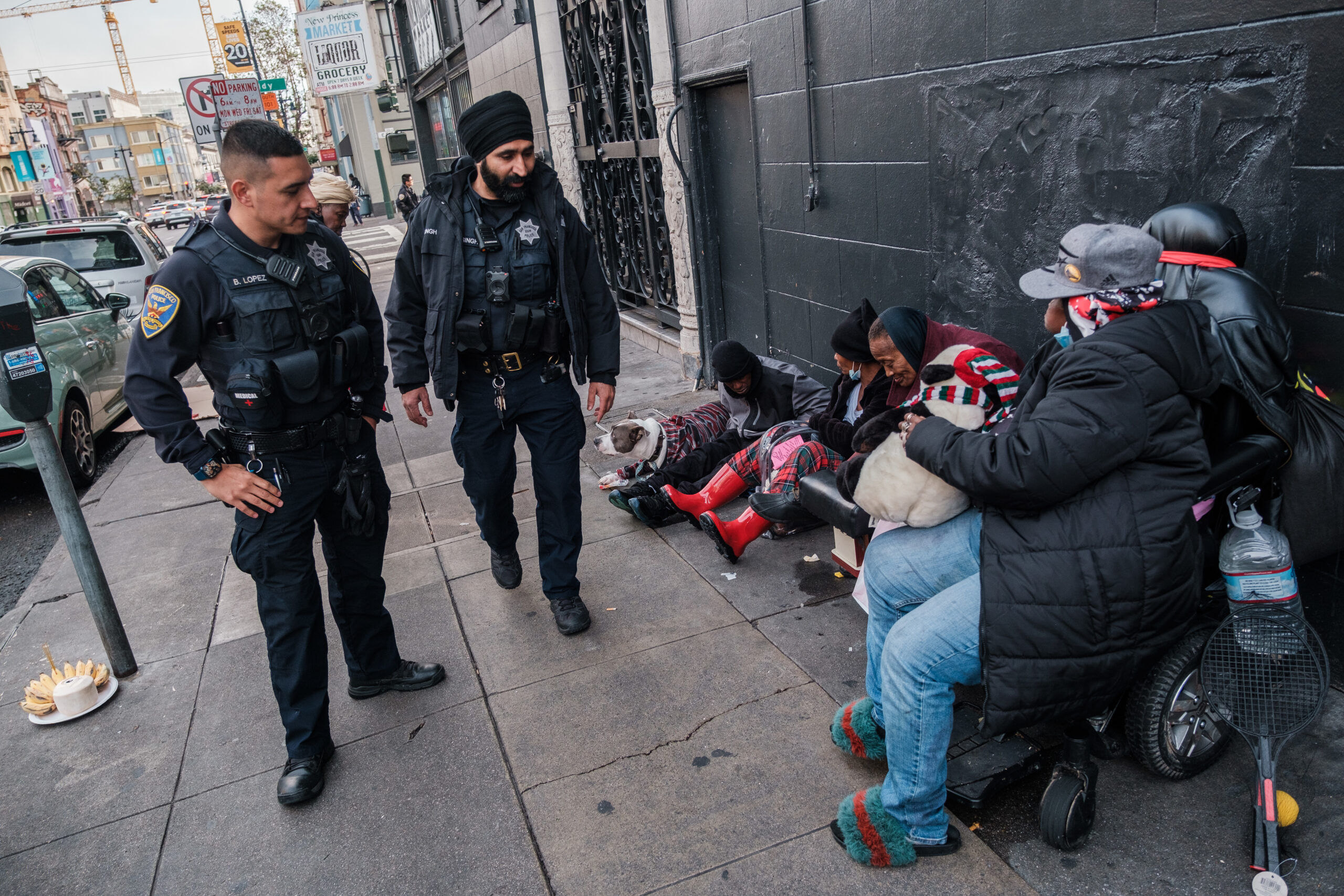Uncertainty looms over the Tenderloin neighborhood as Mayor London Breed’s state of emergency declaration, as it’s currently written, will expire on Thursday, leaving residents and some officials disillusioned by a perceived lack of change in the neighborhood and wondering what happens from here.
The expiration of the current declaration, which is largely a legal formality according to the mayor’s office, signifies a transition to more permanent staffing at a service respite facility called the linkage center—the centerpiece of the mayor’s plan. Under a third declaration signed by Breed on Monday, the state of emergency will continue with a focus of sustaining operations already underway until June 30.
But existing operations haven’t brought much in the way of visible results, according to many Tenderloin locals.
Adnan Alameri, a twenty-year resident and parent in the Tenderloin, was one of many neighborhood residents who rallied in front of City Hall in November and delivered a letter to Breed, pleading for solutions to crime and open-air drug dealing in the neighborhood. The letter demanded an immediate coordinated response to improve safety in the neighborhood.
Alameri said he left a November town hall meeting with Breed feeling encouraged about the prospect for change in the Tenderloin. But to this point, he said, none of the desired outcomes have come true.
“I don’t even feel like [the emergency ordinance] started yet,” Alameri said. “Everything we were asking for hasn’t gotten done.”
“On a couple blocks you’ll see a little change, but then two weeks later they’re all back,” added Raymond Ludwick, a Tenderloin resident of 28 years who said that he hasn’t seen any difference under the emergency. “I’ve seen it all: stabbings, shootings, overdoses.”
Aref Elgaali, owner of Zoul Cafe, said that he’s seen a slight difference but that he still finds people sleeping outside his doorstep on a daily basis. Elgaali added that despite its location across the street from the police station, people sell drugs openly around his restaurant. He worried that as soon as the emergency response is over, things would just revert back to the way they were.
“If [dealers] heard there was continuous action happening I think they would go some place outside the Tenderloin,” he said.
Some of those concerns were echoed by city supervisors at a meeting Tuesday, who expressed confusion about the status of the emergency plan that Breed announced in a spree of public appearances in December.
Supervisors Matt Haney and Hillary Ronen criticized the mayor’s plan for an excessive focus on the linkage center, which opened in a limited capacity a month after the emergency was declared and has since been scrutinized for what critics view as a lack of success in connecting clients with shelter and addiction treatment.
Between February 28 and March 6, the most recent week available, the city reported two “completed linkages” to substance use treatment out of nearly 3,000 total engagements. The city reported five completed linkages to either shelter or the city’s homeless coordinating system. A representative from the Department of Homelessness and Supportive Housing said that the city has not been able to meet the demand of people coming into the linkage center.
“We want to use a model that works, I would’ve expected a lot more shelter placements,” Haney said during Tuesday’s meeting.
Many Tenderloin residents have advocated for a greater police presence to address open-air drug dealing, but said they hadn’t yet noticed a big difference.
Tenderloin Police Captain Chris Canning said at Tuesday’s meeting that the city had just allocated around 20 additional officers to the Tenderloin on Monday—three months after Breed’s promise to crack down on crime in the area. The SFPD Tenderloin narcotics department reported on Tuesday that officers have seized 8.6 kilograms of fentanyl in 2022 so far— up from 2.7 kilograms at this point last year—and Chief of Police Bill Scott told The Standard in a subsequent interview that the department has been using overtime allocations to boost police presence in the Tenderloin.
Alameri said that any enforcement he’s noticed has only pushed problematic individuals to nearby blocks.
“The city is like quicksand; the more money you dump the more problems are created,” Alameri said.
Supervisors from surrounding districts said Tuesday that they’d seen an overflow of crime and unhoused residents in their neighborhoods.
“Conditions are worse than they’ve ever been in the mission, I think, because of the focus on the Tenderloin,” said Supervisor Hillary Ronen. “Where are we going as a city? Our residents are suffering.”
Canning acknowledged that increasing police presence in the Tenderloin is likely to contribute further to this issue.
“The analogy of pushing air in a balloon or toothpaste in the tube around is certainly a challenge,” Canning said.
Representatives from the Mayor’s Office and the Department of Emergency Management, which is overseeing the emergency initiative, describe the current operations as part of a long-range plan to improve safety and street conditions in the Tenderloin.
“The challenges facing the Tenderloin are decades in the making and they won’t be solved overnight,” Andy Lynch, the mayor’s spokesperson, said in a statement. “The City is making a sustained commitment to the community to make the neighborhood safer and healthier, and we’re going to continue building on the progress that’s been made.”
The Department of Public Health hired 160 behavioral health workers in the last 90 days, and officials are working to assure critics that the linkage center will ultimately bring more people into treatment by allowing people to use drugs at the facility.
“The truth is we have some really good long-range plans in place,” added Curtis Bradford, an organizer at the Tenderloin People’s Congress. “This is going to take years of commitment from the city and I hope that they will make that investment.”
